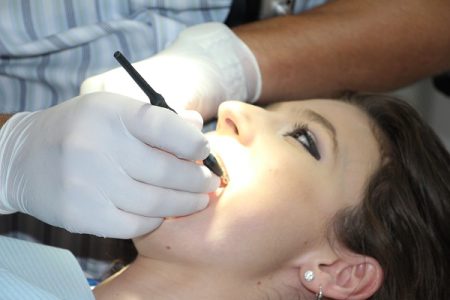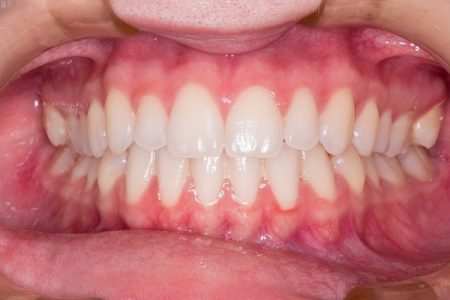Impacted Tooth Pain, Relief and Home Remedies
- Updated on: Jun 26, 2024
- 4 min Read
- Published on Oct 9, 2018


What is impacted tooth pain?
Impaction is when a tooth has simply failed to erupt through the gum at the expected time i.e. the eruption schedule (in reference to the tooth chart). This unerupted tooth is called the impacted tooth. The impacted tooth might face difficulty in coming out due to lack of space between the teeth or the tooth might have grown in a wrong direction or position.
Wisdom tooth – the last teeth to grown in and break through the gums usually between the age of 17 and 21 is the most common among impacted teeth. The second most common example of impacted teeth is maxillary canines.
Wisdom teeth pain can be persistent for some people, while others only experience pain when chewing food or touching the area. It is advised by most dental professionals that wisdom teeth should be removed before wisdom teeth pain becomes an issue. Read impacted wisdom teeth removal and surgery.
What are the symptoms of impacted wisdom tooth? How is impacted tooth pain managed?
Most of the people don’t have any visible symptom of impacted wisdom tooth. Impacted wisdom tooth pain can occur for many days and disappear, come back again after week or month. The impacted wisdom tooth makes the gums exposed and vulnerable, as the surface breaks and the tooth is not fully through. Bacteria and food can get trapped in the broken surface of the gums and cause several issues such as infections, gum diseases, abscesses and cysts.
Impacted tooth pain can be a cause of serious discomfort for many people during opening of the mouth, chewing, and biting.
If you have impacted tooth pain, you may use over-the-counter medication for temporary relief. For mild to moderate impacted tooth pain, aspirin has been found to be an effective treatment but should not be administered to children under the age of 18, because it can increase their risk for a serious condition known as Reye’s syndrome. You should contact a dentist instead of self medication.
You may also use ice as it can help in reducing the inflammation, or you can try wash around your mouth with warm salt water which can relieve the impacted tooth pain.
If you can’t get relief from impacted tooth pain with home remedies and it is getting severe day by day, your doctor may prescribe a pain reliever. Even if home remedies help you mitigate the pain, you should still consult your dentist. Symptomatic pain relief treatments should only be used in short term.
If an impacted tooth is causing pain, your dentist may suggest you to get it surgically removed for a permanent solution.
More: Diagnosis, Symptoms, and Treatment of Tooth Impaction
More: What does an impacted tooth look like?
What are the ways for impacted wisdom tooth pain relief? What are the home remedies for an impacted wisdom tooth pain relief?
For a short term or temporary relief from impacted wisdom tooth pain, you can try one or more of the following home remedies.
Salt water rinse
It is one of the most popular home remedies for toothache. Rinsing your gums with warm water and dissolved sodium chloride (salt) is helpful in healthy gum promotion and to kill harmful bacteria reducing your risk of infection. Sometimes your wisdom tooth can hurt your other teeth or create cysts when they erupt through the gums. It can also be used after a tooth extraction.
Clove and other oil
It is also one of the most popular home remedies for toothache. It has been documented as a potent analgesic. Clove contains eugenol, a natural numbing agent. Research studies have revealed its potential as a topical pain reliever. It can also fight with bacteria that can grow in your mouth and put you at risk for infection.
You can get clove essential oil from the market or alternatively simply boil four to six whole cloves to make clove water which you can massage your painful gums. You should not use it for too long as it may cause burns or irritation in the tongue and the surrounding tissues. Other than the clove oil, there are few more oils which have been reported in scientific literatures as beneficial and which you can use to relieve the pain from an impacted wisdom tooth. Example includes:
- Peppermint oil
- Tea tree oil
- Oregano oil
- Thyme essential oil
- Lavender essential oil
Ice pack
Use of an ice pack to your jaw can help you reduce inflammation, swelling and pain due to dental pain. Ice packs also have a numbing effect which is helpful in alleviating pain. You can hold an ice pack against your jaw with a towel around it for up to 15 minutes. You should apply the ice pack off and on with 15 minute breaks until the pain has subsided.
Aloe vera
Aloe vera can be used to soothe and reduce inflammation around the area of the wisdom tooth eruption. Aloe vera can help heal any cuts due to tooth eruption as well. You can simply apply pure aloe vera gel to the back of your mouth. It will provide temporary pain relief by cooling the area where it is applied.
Menthol
Menthol naturally possesses analgesic property and you feel cooling sensation to your skin when you touch it. It can also be used as a remedy for your wisdom teeth pain. You should dilute a mouthwash that contains menthol, alcohol and peppermint flavour before applying it directly to the affected area.
Other agents which can be used as home remedies agent of pain relief from impacted wisdom tooth includes capsaicin, turmeric, numbing agents containing benzocaine and ibuprofen.
If your pain is not relieved by the use of home remedies, a complete extraction of wisdom teeth can provide a permanent solution. You wisdom tooth will be removed by your dental surgeon at hospital in a dental surgery procedure. The pain due to surgery may last for few days and your gums may get sore after the procedure.












